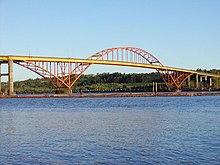Port Mann Bridge
| Port Mann Bridge (2012) | |
|---|---|
 |
|
| Coordinates | 49°13′16″N 122°48′46″W / 49.221031°N 122.812697°WCoordinates: 49°13′16″N 122°48′46″W / 49.221031°N 122.812697°W |
| Carries | Ten lanes of British Columbia Highway 1, pedestrians and bicycles |
| Crosses | Fraser River |
| Locale |
Coquitlam Surrey |
| Maintained by | Transportation Investment Corporation (TI Corp) |
| Preceded by | Port Mann Bridge (1964) |
| Characteristics | |
| Design | Cable-stayed bridge |
| Total length | 2,020 metres (6,630 ft) |
| Width | 65 metres (213 ft) |
| Height | 163 metres (535 ft) |
| Longest span | 470 metres (1,540 ft) |
| Clearance below | 42 metres (138 ft) |
| History | |
| Designer | T.Y. Lin International |
| Construction begin | February 2009 |
| Construction end | September 2015 |
| Construction cost | $820 million |
| Opened | September 18, 2012 |
| References | |
| Port Mann Bridge (1964) | |
|---|---|
 |
|
| Carries | Five lanes of British Columbia Highway 1 |
| Crosses | Fraser River |
| Locale |
Coquitlam Surrey |
| Maintained by | British Columbia Ministry of Transportation |
| Followed by | Port Mann Bridge (second, 2012) |
| Characteristics | |
| Design | Tied-arch bridge |
| Total length | 2093 m |
| Longest span | 366 m |
| History | |
| Designer | CBA Engineering |
| Construction begin | 1957 |
| Construction end | 1963 |
| Construction cost | $25 million |
| Opened | June 12, 1964 |
| Closed | November 17, 2012 |
The Port Mann Bridge is a 10-lane cable-stayed bridge that opened to traffic in 2012. It is currently the second longest cable-stayed bridge in North America and was the widest bridge in the world until the opening of the new Bay Bridge in California. The new bridge replaced a steel arch bridge that spanned the Fraser River, connecting Coquitlam to Surrey in British Columbia near Vancouver. The old bridge consisted of three spans with an orthotropic deck carrying five lanes of Trans-Canada Highway traffic, with approach spans of three steel plate girders and concrete deck. The total length of the previous Port Mann was 2,093 m (6,867 ft), including approach spans. The main span was 366 m (1,201 ft), plus the two 110 m (360 ft) spans on either side. Volume on the old bridge was 127,000 trips per day. Approximately 8 percent of the traffic on the Port Mann bridge was truck traffic. The previous bridge was the longest arch bridge in Canada and third-longest in the world at the time of its inauguration.
The old Port Mann Bridge opened on June 12, 1964, originally carrying four lanes. It was named after the community of Port Mann, through which the south end of the bridge passed. At the time of construction, it was the most expensive piece of highway in Canada. The first "civilian" to drive across the bridge was CKNW reporter Marke Raines. He was not authorized to cross, so he drove quickly. In 2001 an eastbound HOV lane was added by moving the centre divider and by cantilevering the bridge deck outwards in conjunction with a seismic upgrade.
On January 31, 2006, the British Columbia Ministry of Transportation introduced the Gateway Program as a means to address growing congestion. The project originally envisioned twinning the Port Mann Bridge by building a second bridge adjacent to it, but the project was changed to building a 10-lane replacement bridge, planned to be the widest in the world, and demolishing the original bridge.
...
Wikipedia
